Monitoring and Evaluation
Most M&E challenges, such as a lack of sufficient investment and capacities, are not specific to CVA. But those that are relate primarily to monitoring outcomes for unrestricted transfers. The flexibility of cash transfers can make it difficult to determine appropriate outcome indicators, as they may involve a combination of sector-specific and cross-cutting indicators. At the same time, there are limitations on gathering accurate data on how cash transfers are spent.
Grand Bargain signatories have committed to ensuring relevant M&E mechanisms are in place for cash, and increasing understanding of the costs, benefits, impacts and risks of cash relative to other modalities. Building on this, the GB cash workstream has action points including the development of common outcome indicators for multipurpose cash, and metrics for analysing value for money. Systematic value for money analysis has been limited by factors including a lack of agreed upon approaches, the need for quality outcome data, and the intensive nature of the analysis.
Current priorities
As part of the Grand Bargain cash commitments, the CALP Network has co-led (with USAID and CRS) the development of Multipurpose Cash Outcome Indicators. The draft for testing is currently available in English, French and Spanish via the library.
Related initiatives
Featured content

Multipurpose Cash Outcome Indicators – Final Draft for Testing
Guidelines and Tools
Note that the MPC indicators have now been revised. Please click here to access the updated Multipurpose Outcome Indicators and Guidance, which is available in Arabic, English, French and Spanish. Multipurpose Cash Outcome Indicators – Final Draft for Testing Multipurpose cash (MPC) is a type of assistance intended to enable people to meet their basic needs through local...

Monitoring 4 CTP: Monitoring Guidance for CTP in Emergencies
Guidelines and Tools
This guidance provides a central resource to promote a common understanding of the most important monitoring considerations for humanitarian projects using cash transfer programming (CTP). The primary audience for this guidance is field-level practitioners, from organisations directly involved in the design, implementation, monitoring, and accountability of projects using cash and vouchers...

Cost-Efficiency Analysis of Basic Needs Programs: Best Practice Guidance for Humanitarian Agencies
Guidelines and Tools
The Efficiency, Effectiveness and Value for Money Sub-Workstream is pleased to share the final output on Cost-Efficiency Analysis of Basic Needs Programs: Best Practice Guidance for Humanitarian Agencies (attached).
Cost-efficiency analysis estimates the ratio of program costs to outputs created, allowing you to compare cost-per-output for programs which all produced the same output. Such...
Thematic lead
Latest

Cash and Markets In The WASH Sector
Report
Market based programming is increasingly heralded as having a critical place in the future of humanitarian programming. The proposed benefits of working through existing market systems include improvements to speed, efficiency and effectiveness of programming and increased beneficiary dignity and...

Economic Impact of Refugee settlements in Uganda
Report
Uganda is home to close to 800,000 refugees, mostly from South Sudan, Burundi and the Democratic Republic of Congo. It also has one of the most favorable and progressive refugee assistance programs in the world, with freedom of movement, work rights, and land officially set aside for refugees to...

Can E-transfers Promote Financial Inclusion in Emergencies: A Case Study from Bangladesh
Report
The Electronic Cash Transfer Learning Action Network (ELAN) launched research to build an evidence base around connecting emergency electronic transfer (e-transfer) recipients with additional financial services. They wanted to learn if, when, and how e-transfers can promote sustained uptake and use...

Rapid Assessment for Markets: Bidibidi Refugee Settlement
Report
The Rapid Assessment of Markets (RAM) conducted within the Bidibidi Refugee Settlement and in the surrounding Ugandan towns and trading centres sheds some light upon the rapidly developing network of marketplaces within one of the world’s fastest growing refugee settlements. The RAM highligthed key...
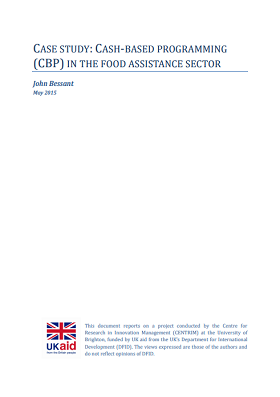
Case Study:Cash-based programming in the food assistance sector
Report
The purpose of this case study is to explore the pattern of innovation in the food supply and distribution area (i.e. not concerned with nutrition). The case raises some key policy issues: How to foster entrepreneurship and create enabling conditions for small-scale experiments and prototypes? How can...
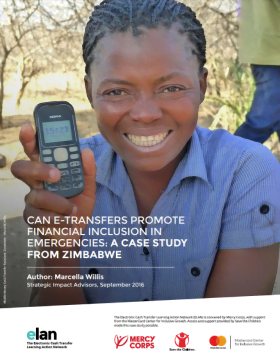
Can E-Transfers Promote Financial Inclusion in Emergencies: A Case Study from Zimbabwe
Case Study
The Electronic Cash Transfer Learning Action Network (ELAN) launched research to build an evidence base around connecting emergency electronic transfer (e-transfer) recipients with additional financial services. They wanted to learn if, when, and how e-transfers can promote sustained uptake and use...

DFID Shock-Responsive Social Protection Systems research: Literature review
Report
DFID has commissioned research into Shock-Responsive Social Protection systems, to further understand the nature of the interaction between social protection, humanitarian and disaster risk management systems and ways in which long-term social protection systems can be scaled up to
provide support in...

Market Analysis and Outcome/Impact Measurement in Cash Transfer Programming in the WaSH and Shelter Sectors in Sudden Onset Disasters
Report
Over the past five years, cash transfer programming has become an increasingly popular modality of humanitarian intervention. Recently, unconditional and unrestricted MPGs have been increasingly championed as a default modality, based on evidence collected by organisations such as the...

Scale Right: Coordinating Improved Cash Assistance in Greece
Report
Europe is still reeling from the largest refugee crisis it has experienced since World War II. During the first half of 2015 Greece saw an average of 3,000 refugees arriving daily by sea onto the island of Lesvos. While the number of new arrivals—fleeing war in Syria, conflicts in Iraq, Afghanistan and...

Using Cash for Shelter: An Overview of CRS Programs
Report
Cash continues to gain prevalence as a modality for humanitarian agencies to help people meet multiple and diverse needs in the wake of a crisis. It provides people with the dignity of choice, and is often significantly more cost-efficient than the delivery of in-kind aid. In programs with a shelter...
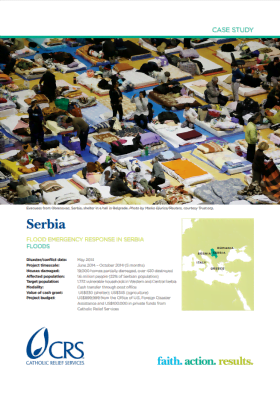
Using Cash for Shelter: Flood Emergency Response in Serbia
Case Study
The devastating floods that affected the Balkans in May 2014 affected 1.6 million people, 22 percent of Serbia’s population, and have set the country’s economic development back decades. Catholic Relief Services (CRS) conducted rapid assessments in 13 villages in the municipalities of Šabac, Valjevo,...

UNHCR Cash Assistance: Improving refugees lives and supporting local economies
Report
UNHCR’s Cash-Based Interventions (CBI) support the most vulnerable Syrian refugees living within the host community in Jordan. Thanks to generous donor support last year, over 30,000 households received monthly cash assistance, winterisation cash, and cash for health, totalling nearly US $ 85 million....
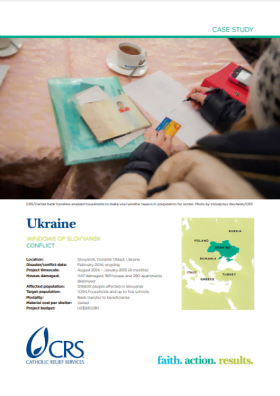
Using Cash for Shelter: Windows of Slovyansk
Case Study
After pro-Russian separatists declared republics in Eastern Ukraine in April 2014, Slovyansk became a focal point of fighting between government forces and rebels until the Ukrainian military retook the city in early July. Slovyansk saw the heaviest fighting of any urban area and many city dwellers fled....

The Politics of Cash: A Case Study on Humanitarian Cash Transfers in Ukraine
Report
This case study examines the evolution of cash transfers in the humanitarian response in Ukraine. The use of cash transfers in Ukraine brought out the best and worst aspects of the international humanitarian system. Uncertainty over where cash fits into the humanitarian architecture – and whether...
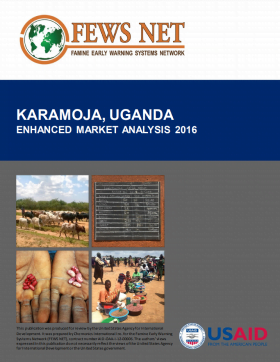
Karamoja, Uganda: Enhanced Market Analysis
Report
The Market Fundamentals reports serves as starting points for providing efficient and effective market-based response decision support for both emergency and development programs in Karamoja Region of Uganda. It examines the appropriateness and feasibility of modality response options for the region.
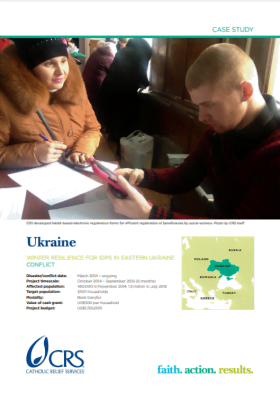
Using Cash for Shelter: Winter Resilience for IDPs in Eastern Ukraine
Case Study
Continued conflict in Eastern Ukraine during 2014 caused internal displacement of over 1.46 million people by September 2015, and another 1,123,800 fled to other countries, according to the United Nations High Commissioner for Refugees. Rapid assessments carried out by Catholic Relief Services found that...

Appropriateness and Impact of Cash Grants Distribution in Eastern Ukraine
Case Study
This programming note assesses the appropriateness and impact of cash grants distribution in Eastern Ukraine. Key findings Distribution of cash grants of US$250 – US$900 via bank transfer allowed beneficiaries to purchase or pay for a wide variety of items or services, including food, medication or...

Scaling Up Humanitarian Cash Transfers in Nepal
Case Study
The Nepal earthquake has a number of lessons for the global debates on scaling up cash both at the level of cash responses themselves and in the more transformational way envisaged by the High Level Panel through which cash can disrupt the established humanitarian system. Humanitarian cash transfers after...
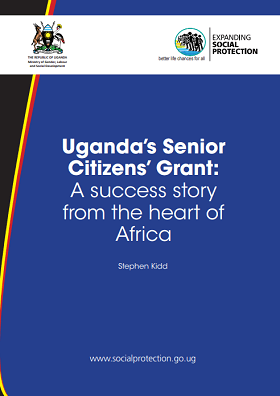
Uganda’s Senior Citizens’ Grant: A success story from the heart of Africa
Report
Since 2011, a pilot universal old age pension – known as the Senior Citizens’ Grant (SCG) – has been implemented in Uganda. By 2016, there were 125,000 beneficiaries. A number of studies have demonstrated that the scheme has had significant benefits. Despite the general economic situation worsening...

Using Cash for Shelter: Rent Assistance for Syrian Refugees
Case Study
Over 600,000 Syrian refugees have arrived in Jordan since 2011; 80 percent of these live in urban or peri-urban locations rather than in camp settings. Families in this situation must pay rent for their shelter, and are therefore subject to shifts in rental market values. Rents have inflated substantially...
